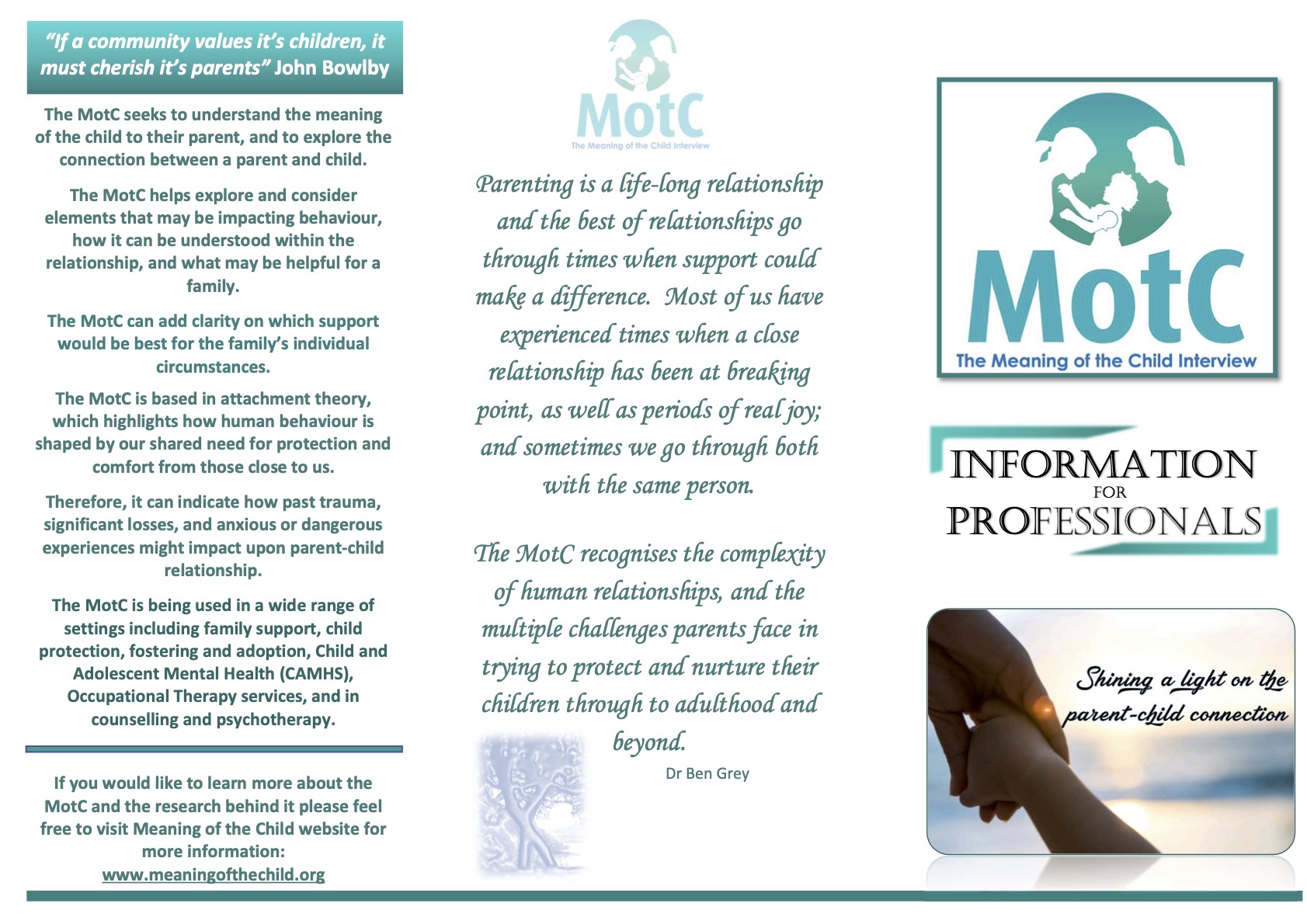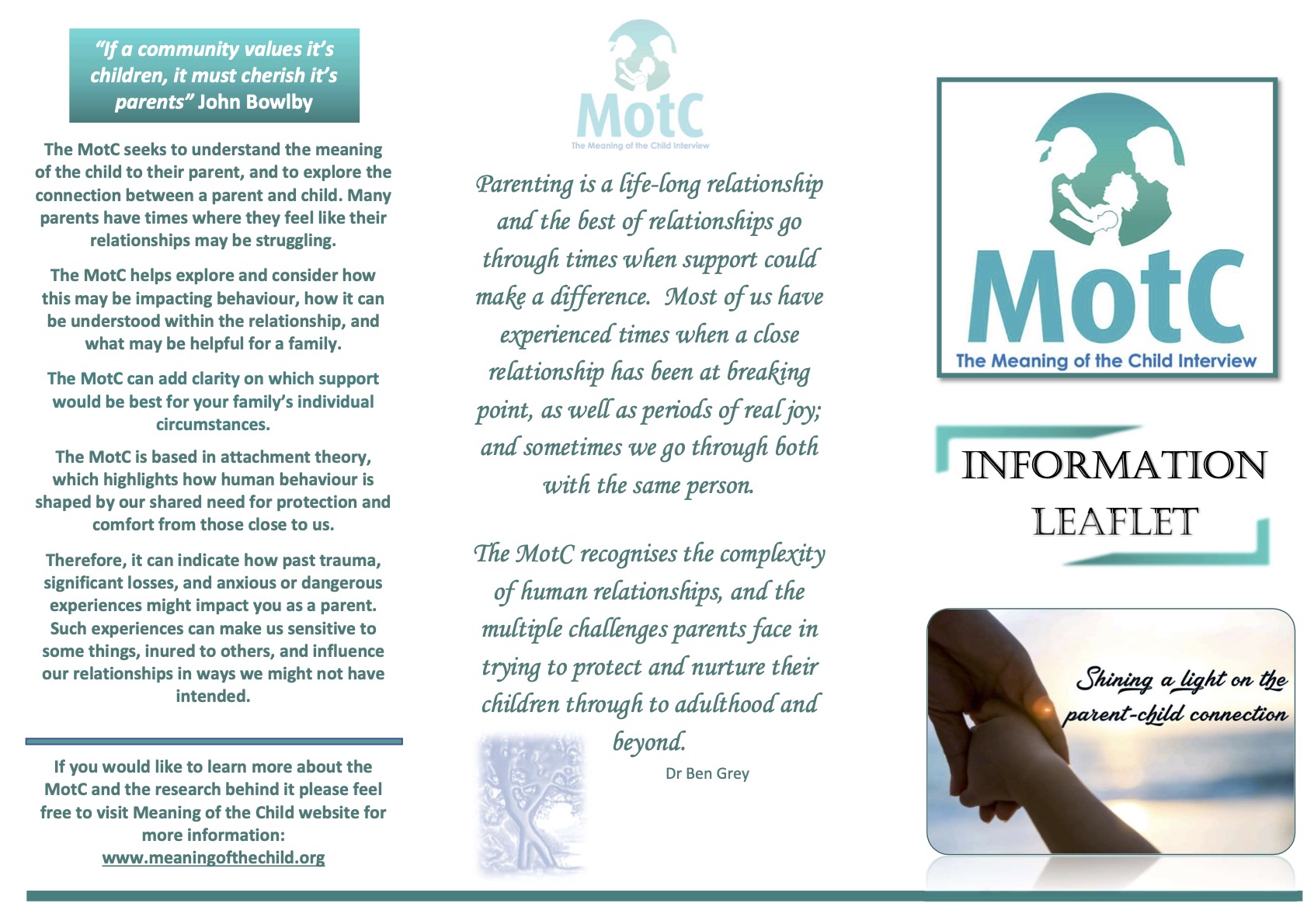“The Meaning of the Child Interview is the most important development in the field of attachment and caregiving since the Adult Attachment Interview.”
Dr Steve Farnfield, co-editor ‘The Routledge Handbook of Attachment’
The Meaning of the Child Interview (MotC) is a method of making-sense of parent-child relationships through the stories parents tell about their children. Through a guided process of integration with other information, it also offers a systematic pathway for applying attachment theory and research to clinical and child-welfare practice.
The MotC sees parenting as a relational dance between parent and child, managed through how the parent regulates the child’s signals of alarm and danger present in the environment. Underlying this is the meaning parents give to their experiences of the child and parenting; stories that serve to create distance, or strive to pull the child closer to the parent. The MotC offers a structured and practical approach to making this visible and useful in planning intervention.
“The children became ‘actors in someone else’s play'”
Reder and Duncan, 1999
The concept of the Meaning of the Child was developed by applying attachment theory and research on adult discourse (patterns of speaking about relationships) to the insights of Reder and Duncan (1995, 1999), whose seminal studies in the 1990’s of fatal child abuse highlighted the importance of attending to the particular psychological meaning that a child has for his or her parent(s). This is fundamental to all parent-child relationships, not just those in difficulty, reflecting the insight that that human development is shaped by how we are seen by those close to us (Fonagy et al. 2004).
“What cannot be communicated to the [m]other, cannot be communicated to the self”
attributed to John Bowlby
The Meaning of the Child Interview differs from similar procedures by its focus on the parent-child relationship (rather than some attribute of the parent). For this reason, it is uniquely suited to helping understand what is going in specific parent-child relationships, the potential impact of this on child development, and the kind of of supportive intervention (if any) that might be needed.
Download Leaflet for professionals


[if printing double-sided, use ‘flip short side’ option]
Possessing a solid foundation basis in academic research and psychological theory, the MotC does not require a specific academic or professional background to learn or use. It has been successfully taught internationally to social workers, family centre workers, therapists, psychologists, occupational therapists, and psychiatrists alike, with training given to Local Authorities (it is currently integrated into the assessment process of Milton Keynes children’s services), CAMHS services, voluntary organisations, and independent social work, psychology and occupational therapy agencies.
“The Meaning of the Child Interview is a sensitive, nuanced, and practical means of developing a deeper understanding of caregiver processes – bridging the research-practitioner divide.”
Mick Cooper, Professor of Counselling Psychology, University of Roehampton, UK, endorsement of ‘The Meaning of the Child Interview; Making Sense of Parent-Child relationships’
The MotC is also used in adoption support, and in fostering services It is now a requirement for Level 2, Sensory Attachment Intervention (SAI) training. The MotC was an integral part of the successful Norfolk Parent-Infant Mental Health Attachment Project (PIMAP) with high-risk families, that significantly reduced the need for child protection involvement, preventing children being removed from their parents (Smith eg al. 2018).
“The Meaning of the Child Interview has proved to be one of the most powerful and informative clinical tools used in our clinical practice, and has helped make sense of some very complex cases… I would highly recommend attending training / seminars at the Cambridge Centre for Attachment.”
Dr Emma Hunnisett, Consultant Clinical Psychologist, Child and Family Psychology Clinic, Norwich
………..
‘The MotC should be seen as a fundamental assessment within child protection. It is one of the very few assessments that is able to consider how both the parent thinks and feels about their child and how the child makes them feel. It is within this area of knowledge that risks posed of serious maltreatment can be safely assessed and managed.’
Barry Tilzey, Consultant Practice Development Lead – London Borough of Wandsworth
[for more testimonials, click here]
………..
Child Welfare and Forensic Settings
Recent UK guidelines for those involved in child welfare decision making (e.g. NICE guidance 26 on children’s attachment), and a consensus of prominent attachment researchers (Forslund et al. 2021) recommend welfare professionals pay attention to the conditions that facilitate supportive attachment relationships.
“Assessment of caregiving should be the primary focus [in family court cases], with attachment assessments a possible complement:
We should first and foremost assess the parent’s ability to understand and respond effectively to the child’s needs, to know and value the child, and to be consistently in charge in the relationship.”
Forslund et al 2021, p.31
The MotC offers just this kind of information.
“As a child protection social worker, I found The Meaning of the Child Interview transformational. Ben Grey masterfully and accessibly integrates attachment, mentalising, offering a practical guide to developing rich, systemic understandings of parent-child relationships. ”
Richard Devine, Social Worker, UK and co-host of the Relational Activism in Social Work Podcast, endorsement of ‘The Meaning of the Child Interview: Making Sense of Parent-child Relationships’
At the same time, these authors rightly advise caution around the use of procedures validated at the group level to make predictions or diagnose pathology in individuals. The MotC is designed to contribute to a wider assessment of the needs of children and their families, and should never be used in isolation to make life-changing decisions around the needs of a child. Neither should the categories yielded by the MotC be seen as a standalone risk assessment, without regard to context.
Instead, the MotC can offer help in these settings by bringing to light the positive intentions of parents to offer love and nurture to their children; giving insight into some of the obstacles that the relationship faces (in particular the impact of traumatic experiences); and guiding work with parents to tackle problems in their lives and parenting, rather than blaming them for complex and multi-faceted difficulties (White et al. 2019). A more systemic and relational understanding of ‘risk’ can help contribute to the broadest possible understanding of the challenges faced by all those concerned with the welfare of a particular child, without glossing over the need for effective action where it is warranted. Smith et al.’s 2018 study of the Norfolk PIMAP project shows how this kind of formulation-based approach using the MotC can achieve significant reductions in children coming into care and the need for child protective services with children at high risk of removal, whilst also helping make better decisions around risk (see also McPherson et al. 2018).
The History of the Meaning of the Child Interview
The MotC was developed by Dr Ben Grey, in conjunction with the University of Roehampton, and Family Care, a former voluntary organisation based in Peterborough, UK, where Dr Grey and Ms Kesteven led a team that carried out assessment and therapeutic intervention for Local Authorities and the Family Courts. The aim was to use expertise in attachment theory and research to develop a tool for understanding parent-child relationships, that was geared towards the needs of assessment, intervention, and decision-making in child welfare and therapeutic practice. It has been taught and used widely since 2011 to all professionals working with families having been adapted to offer a practice model for the application of attachment and caregiving research, theory and practice to child welfare, therapeutic and clinical settings.
Dr Grey is now a principal lecturer on the University of Hertfordshire Doctorate in Clinical Psychology but continues to teach the MotC to practitioners of all kinds over the UK and abroad through Cambridge Centre for Attachment.
